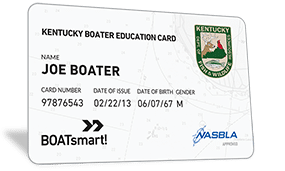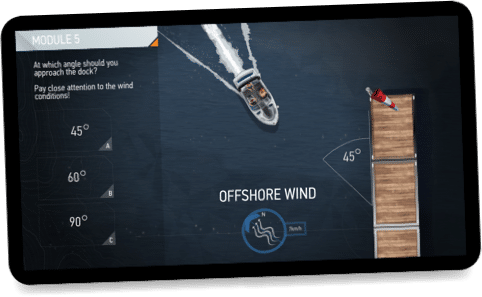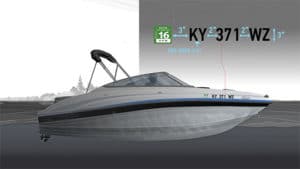
AGE REQUIREMENTS FOR KENTUCKY BOATERS
Boat operators in Kentucky who are 12-17 years of age are required to obtain a Kentucky Boater Education Certificate in order to legally operate a boat with a motor of more than 10 hp.
Excellent!


Official Kentucky Boating Course
The Kentucky BOATsmart! Boating Safety Course is approved and accredited by the Kentucky Department of Fish and Wildlife Resources. With more than 3,000 Five Star Reviews, we’re proud to be recognized as an official Kentucky State Boating Course and the choice of boaters in Kentucky.


NASBLA & Coast Guard Approved
The BOATsmart! Kentucky Boating Safety Course is officially recognized by the United States Coast Guard as meeting the standards of the National Recreational Boating Safety Program. BOATsmart!’s online Kentucky Boating Safety Course is approved by the National Association of State Boating Law Administrators (NASBLA) as it meets and exceeds U.S. Boating Education Standards. NASBLA develops education standards for boating safety and represents boating law administrators in all 50 states and U.S. territories.

Watch, Listen & Learn
From anywhere, on any device at any time.
Our animated and narrated Boating Safety Course is perfect for all ages. Study from your Smartphone, Tablet or Desktop and switch between devices at any time. BOATsmart! automatically tracks your progress so you can study at your own pace.

KENTUCKY BOATING LICENCE REQUIREMENTS
WHAT IS AN KENTUCKY BOATING SAFETY CERTIFICATE
A Kentucky Boater Education Certificate proves that you’ve obtained the knowledge needed to safely operate a motorized boat on Kentucky waterways. All boat operators who are 12-17 years of age are required to get certified to legally operate a boat with a motor of more than 10 hp.
WHERE CAN I GET MY KENTUCKY BOATING LICENSE?
You can get your Kentucky Boater Education Certificate by completing the Official BOATsmart! Course online. Once you successfully complete the online study guide and final exam, you can print a temporary card immediately. BOATsmart! will mail your permanent card within 4 weeks.
HOW OLD DO I HAVE TO BE TO GET A BOATER CARD IN KENTUCKY?
There is no minimum age to complete the Kentucky Boater Education Course and get certified.
AGE AND HORSEPOWER RESTRICTIONS
Children under 12 years of age are not legally permitted to operate any motorized boat of more than 10 horsepower, including personal watercraft (PWCs).
Persons who are 12-17 years of age may legally operate a boat of more than 10 horsepower under one of the following circumstances:
- They have successfully completed a Boating Safety Course, and are carrying their Boater Education Certificate on the boat.
- They are directly supervised by a legal adult OR a person who has obtained a Boater Education Certificate through completion of an approved course.
HOW LONG DOES IT TAKE TO GET MY KENTUCKY BOATING LICENSE?
It takes a minimum of 3 hours to get your Kentucky Boater Education Certificate online. Once you’ve completed the online course and official test, you can print a temporary card and go boating right away. Your permanent card will be mailed to you by BOATsmart! within 4 weeks.
CAN I GET REFRESHER LESSONS AFTER TAKING THE KENTUCKY BOATING COURSE?
BOATsmart! Offers a free online Knowledge Base of the most up-to-date Kentucky boating laws and regulations, including boating equipment requirements, navigation and right-of-way regulations and restrictions that may apply on Kentucky State waterways.
DO I NEED A LICENSE TO RENT A BOAT IN KENTUCKY?
Boat operators in Kentucky are not required to obtain a Kentucky Boater Education Certificate to rent a boat within the state.
Boating and alcohol in Kentucky
KENTUCKY BOATING AND ALCOHOL LAWS
It is against the law to operate a boat or vessel including a personal watercraft (PWC), manipulate waterskis, surfboard or other similar device while intoxicated or under the influence of any other substance that impairs one’s driving ability.
In Kentucky, a person is considered to be under the influence if they have a Blood Alcohol Concentration (BAC) level of 0.08 or higher.
LAWS FOR PUBLIC INTOXICATION
In Kentucky, it is illegal to drink alcoholic beverages in public places (this excludes licensed establishments). The waterways of Kentucky are considered public places. Additionally, in a public place, a person who is under the influence of alcoholic to the extent that they may unreasonably annoy or endanger themselves or others, shall be subject to arrest.
FINES AND PENALTIES
In Kentucky, a person convicted of operating a boat under the influence will be subject to the following penalties:
- Upon a first conviction, a person will receive a fine from $200-$250.
- Upon a second conviction, a person will receive a fine from $350-$500.
- Upon a third or subsequent conviction, a person will receive a fine from $600-$1000 and/or imprisonment for a minimum of 30 days.
Kentucky Boating Age Requirements

UNDER 12 YEARS OF AGE
Children under 12 years of age are not legally permitted to operate any motorized boat of more than 10 horsepower, including personal watercraft (PWCs).

12- 17 YEARS OF AGE
Persons who are 12-17 years of age may legally operate a boat of more than 10 horsepower only under one of the following circumstances:
- They have successfully completed a Boating Safety Course, and are carrying their Boater Education Certificate on the boat.
- They are directly supervised by a person who is 18 years of age or older who has obtained a Boater Education Certificate through completion of an approved course.

Kentucky's Boating Fines

Operating under the influence
Up to $1000

Misuse of marine sanitation device
Up to $500

Illegal discharge of waste
Up to $500

Life jacket violations
Up to $50
General Kentucky boating FAQs
WHO REGULATES BOATING LAWS IN KENTUCKY?
The Kentucky Department of Fish and Wildlife Resources is responsible for regulating boating laws in the state of Kentucky.
Boating Emergencies:
Call 911 to report a boating emergency in Kentucky
WHO ENFORCES KENTUCKY’S BOATING LAWS?
Boating laws in Kentucky are enforced by:
- Officers of the Kentucky Department of Fish and Wildlife Resources.
- All other peace officers.
- The Coast Guard on federal waters.
Kentucky’s law enforcement officers have the authority to stop and board a boat to ensure the boat is complying with state and federal laws.
Operators are legally required to abide by any direction given by law enforcement, including bringing the boat to a stop, if signaled to do so.

How to register a boat in Kentucky
ARIZONA BOAT REGISTRATION
To legally operate a motorized boat in Kentucky, the boat must be registered. Boats are registered at the County Clerk’s office and are valid on a yearly basis, expiring on April 30th, of each year.
Upon registering your boat, you will be provided with a Kentucky Certificate of Registration and registration decals. The Certificate of Registration must be carried on board during operation and be available for inspection by law enforcement, if required.
Upon purchasing a boat, the boat owner will be required to apply for a title within 15 days of the boat purchase/transfer of ownership.
THESE VESSELS DO NOT REQUIRE REGISTRATION IN KENTUCKY
- Human-powered craft.
- Boats that have been federally documented by the Coast Guard.
- Boats that have been registered in another state and are using Kentucky waters for 60 days or less.
BOAT TITLING REQUIREMENTS
Kentucky issues titles for all registered boats except those which are federally documented by the Coast Guard.
Whenever a boat is transferred or purchased, the seller shall, within 15 days, give the county clerk notice of the transfer of ownership.
HULL IDENTIFICATION NUMBER REQUIREMENTS
Owners of homemade boats must apply to the Kentucky Department of Transportation in order to obtain a Hull Identification Number
DO I NEED BOAT INSURANCE IN KENTUCKY?
Boats in Kentucky are not required to be insured, however it is recommended.

Boats in Kentucky are required to correctly display their registration number and validations stickers.
Registration numbers and stickers must be displayed as follows:
- Numbers must be painted or permanently affixed to the forward half of each side of the boat where it can be easily seen (boat owners are not permitted to display any other numbers in this area).
- The number must be read from left to right.
- The number must be in vertical block letters that are at least 3 inches high, and in a color that contrasts with the color of the boat.
- The numbers must be separated from the letters by a hyphen or equivalent space.
- Decals must be placed towards the stern of the boat (behind the registration number) and must be within 6 inches of the registration number and in line with it.
- The same placement requirements apply to personal watercraft (PWCs).
Kentucky lifejacket laws

KENTUCKY’S LIFE JACKET LAWS
All boats must carry a Coast Guard-approved, Type I, II, or III lifejacket for each passenger on board.

BOATS MORE 16 FT IN LENGTH
Boats that are 16 feet in length and greater, excluding canoes and kayaks, must also carry one, Type IV throwable flotation device (such as a life ring).

Personal Watercraft
Any person operating a PWC is required to wear a Coast Guard-approved lifejacket.

CHILDREN 12 YEARS OF AGE AND UNDER
In Kentucky, passengers 12 years of age or under are required to wear a Coast Guard-approved life jacket while underway on any open boat or when on the open deck of any type of boat.
Personal watercraft laws & regulations
RECKLESS BOAT OPERATION
In Kentucky it is illegal to operate a boat in a reckless, negligent, or dangerous manner which may endanger the life or property of any person. The operator of a watercraft will be held responsible for any damage caused by negligent operation.
Additionally, Kentucky boaters on the Ohio River may also be subject to the laws of Ohio, Indiana, Illinois and the Coast Guard.
Examples of reckless operation include:
- Weaving through congested boat traffic.
- Jumping the wake of another boat in such a way that endangers the life, safety, or property of any person.
- Cutting between a boat and a person being towed by the boat.
- Crossing the path of another boat when visibility is obstructed.
- Steering toward an object or individual in the water and turning sharply at close range.
- Following another boat too closely that is towing a person on water-skis, a surfboard or any towed sport device.
- Operating a boat that has been overloaded.
BOAT SPEED LIMITS AND OPERATION IN RESTRICTED AREAS
In Kentucky, boat operators must keep their boats at “No Wake” speed when operating in any area that has been designated as a “No Wake” zone.
Additionally, in Kentucky it is illegal for boats to operate within restricted areas as posted above or below navigation, power generating, or flood control dams.
Environmental Protection
NON-NATIVE AQUATIC SPECIES
American waterways have been under threat from foreign aquatic plants, fish and invertebrates. Aquatic Nuisance Species (ANS) are transferred from boats and boating equipment that originate from external waterways. Once introduced to a new waterway, the ANS will detach from the contaminated boat and spread like wildfire. ANS include: Milfoil, Zebra Mussels and Quagga Mussels.
Why are ANS such a serious threat?
- They have no natural predators in U.S. waters.
- Some ANS can actually survive out of water, making transfer easy.
- They reproduce quickly.
- They have harmful effects on the native wildlife, habitats and ecosystems.
For more information on Aquatic Nuisance Species, visit: www.protectyourwaters.net/impacts.php.
HELP PREVENT THE SPREAD OF NON-NATIVE SPECIES
- Inspect all surfaces of your boat and remove aquatic plants or animals before leaving any body of water.
- Ensure you flush raw-water cooling systems and clean sea-strainers before moving your boat from one body of water to another.
- Empty and dry any buckets before leaving a body of water.
- Remove any plant fragments from bait wells, fishing gear, trailers, dive gear or props.
- Dispose of plant fragments and bait into a garbage receptacle on land.
- Avoid chopping vegetation with your boat’s propeller.
- Clean and dry all live-wells prior to transporting your boat.
- Drain all water from your motor and bilge and dry all areas. t.
- Thoroughly wash your boat, including the hull, before putting it into a new body of water.
- Refer to specific drying times.
Infestations of non-native species
Report new infestations of non-native aquatic species to the U.S. Fish and Wildlife Service at (209) 946-6400.
KENTUCKY AIS REPORTING
Contact the KDFWR Fisheries Division at (270) 759-5295 to report Aquatic Invasive Species
The Bluegrass State, Blue Waters, Good Times

Kentucky Boating Destinations
BOATING IN KENTUCKY
Go boating in Kentucky – it’s so easy to get on the water! There are vast stretches of navigable water flowing through the state and the boat launch ramps and boat rental facilities on Kentucky’s popular lakes and rivers are all within easy reach of most towns and cities!
So whether you’re from a big city in KY like lovely Lexington in Derby Country or flashy Louisville, or maybe you’re from a cozy, little place like Bardstown, there’s sure to be a boating opportunity around the next bend! Oh, and in case we forgot to mention it, the fishing is really, really good in Kentucky!
MARINAS AND LAUNCH RAMPS
Looking for a boat launch ramp? A marina that sells ice cream cones? A lakeside campground? a place to fuel up or maybe a boat storage facility? Visit the official Kentucky Tourism website to see a complete list of the marinas in your state region!
KENTUCKY BEST BOATING LAKES
With popular boating lakes in Kentucky like Lake Cumberland, Lake Barkley and Kentucky Lake, the bluegrass state has become a serious destination for power boaters and paddlers.

